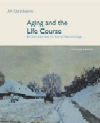1. David Hackett Fisher, a well-known social historian discussed in this text,
wrote a book called Growing Old in America (Oxford University Press, 1978).
In this book, Fisher discusses the traditional veneration of the aged, and how
Americans' attitudes toward the aged have changed over time. Go to the website (http://www.unt.edu/natla/),
type "changing attitudes" in the search bar, and select and read the
article titled "Changing Attitudes," which discusses Fisher's work.
After reading the article, answer the following questions: - Americans' new attitudes toward age and the aged have been manifested in
several ways. Discuss three of those ways.
- What is gerontophobia?
- What happened when the old system of family responsibility for the aged
began to break down?
2. Alan Pope of Duquesne University has written an article about changing attitudes
toward the elderly, which was published in the Janus Head Journal. Go to (http://www.janushead.org/),
type "attitudes toward elderly" in the search bar, and link to JanusHead/Alan
Pope/Elderly in Modern Society. Read the following sections in Pope's article:
Introduction, The Elderly as a Cultural Figure, and Historical Development of
the Elderly. Then answer these questions: - Explain what the author means when he writes "One way that people hide
from the reality of ageism is to cast as benevolent those very ways in which
elderly individuals are dissociated from society."
- Pope claims that when the term "Elders" was replaced with "the
elderly," society ceased to venerate the aged. Explain why he makes this
claim.
- How are the elderly viewed in both modernization and egalitarian theory?
3. Colonial American (http://www.hfmgv.org/education/smartfun/colonial/intro/index.html)
is a web site that was put together by the Henry Ford Museum. At the site, you
can access interactive exercises. Then click on "Begin." As you
go through the interactive exercise, answer the exercise questions and those
below. - What is a housewright?
- What were some skills of "housewifery" that daughters had to learn?
- How many slaves were there in this community?
- Where did most people get their news?
4. The Australian Institute of Family Studies (http://www.aifs.org.au/institute/pubs/fm1/fm32pm.html)
provides the public with information and research about families and their well
being. Read the article, "Extended Family in Australia: The Family Beyond
the Household" by Peter McDonald. Answer the following questions: - What did 19th century scientists say had victimized the extended
family?
- How did sociologists of the 1950s see the nuclear family?
- In the past 300 years to 400 years, there has been an emphasis on what?
- What are the four dimensions that people use to define their own families?
|



 2002 McGraw-Hill Higher Education
2002 McGraw-Hill Higher Education